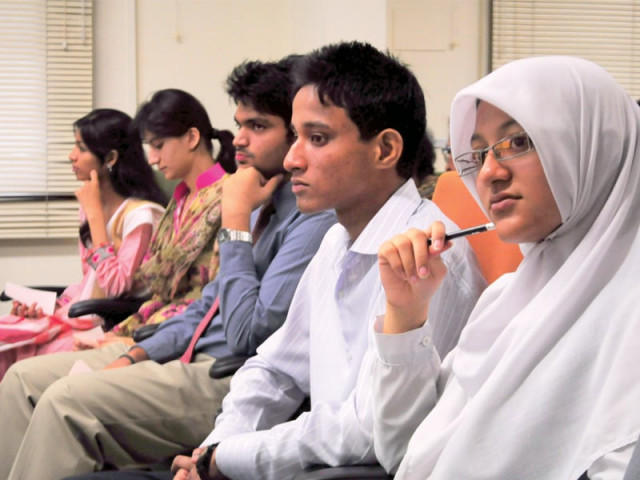At AKU board, students excel without rote learning
AKU-EB celebrates its high achievers at annual ‘Passing the Torch’ awards.

At AKU board, students excel without rote learning
Zubaida Farooq, the mother of Sheharyar Farooq who placed third in the SCC examinations, was beaming with pride at her son’s achievement being celebrated at the Passing of the Torch student awards ceremony held at the Aga Khan University Examination Board (AKU-EB) on July 18. “He is our youngest, and the first to hold a position.”
The second annual Passing the Torch ceremony celebrated students who attained distinctions in the Secondary School Certificate (SSC) and Higher Secondary School Certificate (HSSC). It was a literal ‘passing the torch’ ceremony as position holders from the previous year handed out certificates to this year’s top performers to highlight the transfer of knowledge and responsibility. The AKU-EB is a Federal Board of Intermediate and Secondary Education that was founded in 2003, offering examination services for SSC and HSSC across Pakistan and abroad.
AKU-EB Director Dr Thomas Christie congratulated the achievers, lauding their “sparkling performances.”
He said that it was commendable to see people from the Northern Areas also perform so well in the examinations. “This is the case of young people who have the grit and determination to succeed!”
Christie said he was “eager to see a trend towards a more thoughtful approach in which students were not simply absorbing the subject matter, but challenging it.”
In the SSC examinations, Syed Wahaj Ahmed of Shahwilayat Public School, Karachi took the first position, Sadaf Batool Rizvi of Al Murtaza School, Karachi came in second, and the third place was shared by Zehra Hussaini of Habib Girls School, and Sheharyar Farooq of Sultan Muhammad Shah Aga Khan School.
In the HSSC exams, Anum Zehra Raza of Aga Khan Higher Secondary School, Karachi was awarded the first position, Hafsa Jawed of Habib Public High School (Girls), Karachi snagged second place, and Adil Shah of the Aga Khan Higher Secondary School in Gahkuch, Gilgit Baltistan came in third.
Zehra Nizar, an AKU-EB alum who is currently studying at the Aga Khan University Medical College, spoke at the event. Nizar said it was a heart-warming experience to give away the awards, recalling her own joy when she was awarded third position for the HSSC in 2011. She said that the AKU-EB is unique in the sense that “the pattern of learning facilitates understanding, promotes conceptualisation, and negates rote-learning.” She explained the ceremony as a “symbol for passing on enlightenment.”
Hafsa Jawed, who clinched the second position in HSSC also emphasised the lack of rote-learning in these examinations. “A-Levels students say that their exams are difficult, but 50% of their questions are from past papers. In the AKU-EB, a question is never repeated.”
Sadaf Batool, who got the second position in the SCC exams, said that the syllabus was extremely lengthy and heavy on reading. “These exams are very difficult compared to the Sindh Board examinations because you have to read, understand and absorb knowledge.” Batool began studying for the exams last August, saying that her parents pushed her to strive to achieve a position. “The most important thing that helped me study was daily recitation of the Quran.”
Anum Zehra, who held the first position in HSSC, said she did her studying at night when her family was asleep. “I never took any tuition. My parents always helped me study.” She said that the AKU-EB is a transparent system and one can be sure about the results.
Since she wants to become a doctor, Anum Zehra believes the AKU-EB fully prepared her to sit for medical school entrance examinations. “The aptitude test for entrance to medical schools matches the conceptual pattern of AKU-EB exams,” she said.
Published in The Express Tribune, July 19th, 2012.



















COMMENTS
Comments are moderated and generally will be posted if they are on-topic and not abusive.
For more information, please see our Comments FAQ